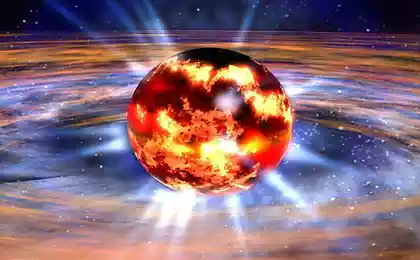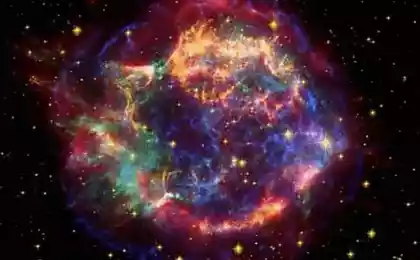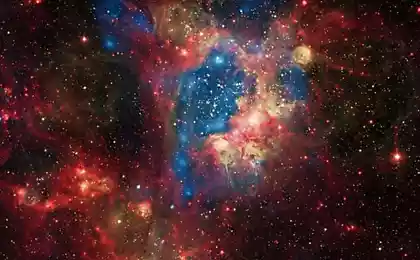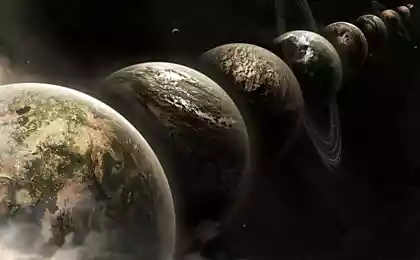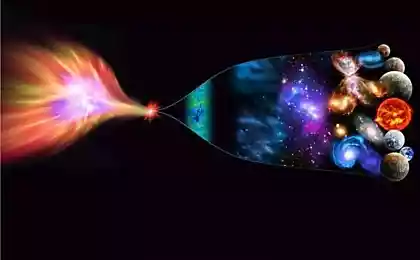643
The anthropic principle: what if the universe is tuned for us?
Seventy five million eight hundred twenty seven thousand one hundred seventy one
When we look at the Universe, it is difficult to imagine that it's all — planets, stars, galaxies, and the complex life that we enjoy, — all arose by chance. Wherever you look, the universe obeys the same laws, the same fundamental constants, particles, we find the same, the interactions between them make the particles together and they form what we know. And in all this there is a certain inevitability.
Our universe seems very finely tuned to be this way, but could it be in reality? In science, if we want to learn something, we must ask ourselves questions about the nature of the object. Let's see how our universe and what we can learn from this.
One of the first things you discover, and it is taken for granted, if you think about it well, is that in Universe a lot of stuff. And this fact itself is amazing, because everything must be wrong.
Our laws of nature, physical laws governing the interaction of every particle in the Universe, including the forces that lead to that matter is bound, interacts with gravity, stick together and collected in clusters, these laws seem to be the same everywhere. We know how they affect all the known particles in the Universe, and they give us a framework for understanding how the universe had to evolve to be what it seems today.
But knowledge of the laws of physics — the knowledge of how all the various particles interact with each other — not responding to questions about our existence. Of course, many things they say, tell about the behavior of the physical system, which starts with the defined characteristics. Give us the initial conditions give us the laws governing all present particles, and we can tell you what will happen to a certain extent, physically deterministic.
Space-time expands or shrinks, bends depending on the matter and energy that it contains. Particles are attracted, repelled or linked together depending on the conditions under which they interact. Some systems will be stable; others will disintegrate after some time. The scientific process is very powerful and does quality work, telling us how it all happens.
But he does not tell us why or in fact whether all that happens, happens inevitably and invariably. Sometimes we need a guide if we want to expand their knowledge and understanding of the Universe. It would have helped a guiding principle that would indicate where to look.
For example, have long known that the universe contains a great variety of elements, or atoms with different numbers of protons in their nuclei. You keep themselves at least 59 different elements in the body in different proportions, however long time we did not know how these elements become so. However, one thing we can say with confidence: we are here and we are seeing the Universe.
This simple and obvious fact actually has a large mass. He tells us that our universe exists with such properties that it would appear to the reasonable observer.
Thirty seven million eight hundred fifty thousand eight hundred fifty eight
This statement sharply contrasts with the fact that the Universe can have properties that are incompatible with the existence of intelligent life. The logic is quite simple: if the properties of our Universe prohibit intelligent life from the beginning, she just can't be ours because it will never be the one who's going to watch. The simple fact that we are here and observe the Universe, combined with the act of observation means that the universe is configured in such a way as to recognize our existence. This is the essence of the so-called anthropic principle.
And only one that can tell us some interesting things.
If our universe was full of heavy elements, there should be several ways to synthesize them. In the early 50-ies it was widely recognized that the basis of the life of stars lies in nuclear fusion and our Sun can synthesize helium from hydrogen for long periods of time. But it's the two lightest elements in the Universe! You can't fuse hydrogen (mass 1) and helium (mass 4) to go further because there is simply no stable nuclei with mass 5, and you can't connect two nuclei of helium, because beryllium-8 (almost identical weight) is unstable and decays back into two helium atom in about ~10^-16 seconds.
But in 1952, the Fred Goyle used the anthropic principle as a reason why that should be the process to create heavier elements. He concluded that there must be a way to add a third helium — to interact with the highly unstable beryllium-8, and to synthesize them into carbon-12. The fact that their masses are not the same. Carbon-12 has a much smaller mass than the beryllium-8 and helium-4 together, so Goyle made a fascinating prediction: there should exist an excited state of carbon-12, which nuclear physicists have not yet discovered, which precisely corresponds to the mass of the three nuclei of helium-4 together.
Thirteen million three hundred forty five thousand two hundred ninety nine
It was an extremely bold prediction, spitting in the face of known nuclear physics: such a state could be discovered at that time only by experiment. But Goyle announced his forecast nuclear physicist Willy Fowler, and the need of existence of such condition, that the Universe was carbon, and hence life. Fowler began searching. Five years later produced the opening theoretical status Goyle, and the mechanism of its forming a triple alpha process or the triple helium reaction. In the same year, both scientists along with Geoffrey and Margaret Burbidge published a paper which correctly describes the origin of all heavy elements in the Universe: the cores of giant stars that become supernovae, enriching the Universe!
The anthropic principle helps us to understand why properties of the Universe must be within a certain range of values, we must exist in a range that makes possible the existence of life.
Gravity can't be stronger than it is, or the Universe would be only black holes and nothing more. Dark energy (or cosmological constant) cannot be more than 100 times than the observed value, or gravity would not allow to form a single star before the primary atoms would fly to the side. Needs to be a fundamental asymmetry of matter and antimatter in the Universe, because otherwise the formation of the Universe as we know it, would not be enough filling.
Although there are many variants of the anthropic principle, postulated about it this way:
The laws of nature must be such that the universe could exist in accordance with observations about what it should be. This statement is pretty hard to argue. And yet, in itself, it is not the scientific answers to any problems.
We know that in the Universe there is an asymmetry of matter-antimatter, but understanding that we need it to satisfy the anthropic constraints, does not tell us why the Universe is matter but not antimatter that we observe and interact with.
Thirty five million five hundred eighty three thousand four hundred forty nine
Physicists often make the assumption — and it is not necessarily good — in principle the laws and constants of nature can take any number of forms and meanings. If you accept it, then of course our universe is what we observe, must have laws and constants that are consistent with the existence of a reasonable observer.
But if you follow this line of thinking, you will never understand how it happened.
This unscientific line of thinking rears its ugly head, when people think about the problem of the cosmological constant (or dark energy), asking why the universe is finely tuned to have the value of the cosmological constant which we observe about 10^120 orders of magnitude smaller than our naive forecast. The argument is something like this:
"Well maybe our naive calculations for the cosmological constant give us a very large, once in 10^120 more, but 10^500 possible universes, in at least several of them will be the correct amount, but others do not matter, because there's nobody there". Ninety nine million five hundred sixty nine thousand seven hundred
This argument is not wrong so much as to be tantamount to waiver or approval of physics that our universe is explainable and understandable from the point of view of physical laws and dynamics. There are many other problems that have similar problems, like the asymmetry of matter-antimatter (10 orders of magnitude different from our estimate), the masses of fundamental particles (by 19 orders of magnitude different from what we expected) and the relative weakness of the gravitational force (30 orders of magnitude weaker than the other).
Any type of scientific thinking is only meaningful when it tells you something you don't know yet, and we already know that we live in this Universe and that it has observable properties. The phrase "as it should be, because we are here" is both logically flawed (it could be different, and we could still be here), and anything new teaches us. Our universe may be finely tuned to a certain extent, but the anthropic principle doesn't tell us why or why.
And that's not all. Without knowing why, and why the universe became what it is, we have no science, in any case, it will be incomplete. And this answer does not satisfy me and should satisfy you if you're a reasonable man. The anthropic principle can guide us, but he provides no answers in itself.published
Source: hi-news.ru
When we look at the Universe, it is difficult to imagine that it's all — planets, stars, galaxies, and the complex life that we enjoy, — all arose by chance. Wherever you look, the universe obeys the same laws, the same fundamental constants, particles, we find the same, the interactions between them make the particles together and they form what we know. And in all this there is a certain inevitability.
Our universe seems very finely tuned to be this way, but could it be in reality? In science, if we want to learn something, we must ask ourselves questions about the nature of the object. Let's see how our universe and what we can learn from this.
One of the first things you discover, and it is taken for granted, if you think about it well, is that in Universe a lot of stuff. And this fact itself is amazing, because everything must be wrong.
Our laws of nature, physical laws governing the interaction of every particle in the Universe, including the forces that lead to that matter is bound, interacts with gravity, stick together and collected in clusters, these laws seem to be the same everywhere. We know how they affect all the known particles in the Universe, and they give us a framework for understanding how the universe had to evolve to be what it seems today.
But knowledge of the laws of physics — the knowledge of how all the various particles interact with each other — not responding to questions about our existence. Of course, many things they say, tell about the behavior of the physical system, which starts with the defined characteristics. Give us the initial conditions give us the laws governing all present particles, and we can tell you what will happen to a certain extent, physically deterministic.
Space-time expands or shrinks, bends depending on the matter and energy that it contains. Particles are attracted, repelled or linked together depending on the conditions under which they interact. Some systems will be stable; others will disintegrate after some time. The scientific process is very powerful and does quality work, telling us how it all happens.
But he does not tell us why or in fact whether all that happens, happens inevitably and invariably. Sometimes we need a guide if we want to expand their knowledge and understanding of the Universe. It would have helped a guiding principle that would indicate where to look.
For example, have long known that the universe contains a great variety of elements, or atoms with different numbers of protons in their nuclei. You keep themselves at least 59 different elements in the body in different proportions, however long time we did not know how these elements become so. However, one thing we can say with confidence: we are here and we are seeing the Universe.
This simple and obvious fact actually has a large mass. He tells us that our universe exists with such properties that it would appear to the reasonable observer.
Thirty seven million eight hundred fifty thousand eight hundred fifty eight
This statement sharply contrasts with the fact that the Universe can have properties that are incompatible with the existence of intelligent life. The logic is quite simple: if the properties of our Universe prohibit intelligent life from the beginning, she just can't be ours because it will never be the one who's going to watch. The simple fact that we are here and observe the Universe, combined with the act of observation means that the universe is configured in such a way as to recognize our existence. This is the essence of the so-called anthropic principle.
And only one that can tell us some interesting things.
If our universe was full of heavy elements, there should be several ways to synthesize them. In the early 50-ies it was widely recognized that the basis of the life of stars lies in nuclear fusion and our Sun can synthesize helium from hydrogen for long periods of time. But it's the two lightest elements in the Universe! You can't fuse hydrogen (mass 1) and helium (mass 4) to go further because there is simply no stable nuclei with mass 5, and you can't connect two nuclei of helium, because beryllium-8 (almost identical weight) is unstable and decays back into two helium atom in about ~10^-16 seconds.
But in 1952, the Fred Goyle used the anthropic principle as a reason why that should be the process to create heavier elements. He concluded that there must be a way to add a third helium — to interact with the highly unstable beryllium-8, and to synthesize them into carbon-12. The fact that their masses are not the same. Carbon-12 has a much smaller mass than the beryllium-8 and helium-4 together, so Goyle made a fascinating prediction: there should exist an excited state of carbon-12, which nuclear physicists have not yet discovered, which precisely corresponds to the mass of the three nuclei of helium-4 together.
Thirteen million three hundred forty five thousand two hundred ninety nine
It was an extremely bold prediction, spitting in the face of known nuclear physics: such a state could be discovered at that time only by experiment. But Goyle announced his forecast nuclear physicist Willy Fowler, and the need of existence of such condition, that the Universe was carbon, and hence life. Fowler began searching. Five years later produced the opening theoretical status Goyle, and the mechanism of its forming a triple alpha process or the triple helium reaction. In the same year, both scientists along with Geoffrey and Margaret Burbidge published a paper which correctly describes the origin of all heavy elements in the Universe: the cores of giant stars that become supernovae, enriching the Universe!
The anthropic principle helps us to understand why properties of the Universe must be within a certain range of values, we must exist in a range that makes possible the existence of life.
Gravity can't be stronger than it is, or the Universe would be only black holes and nothing more. Dark energy (or cosmological constant) cannot be more than 100 times than the observed value, or gravity would not allow to form a single star before the primary atoms would fly to the side. Needs to be a fundamental asymmetry of matter and antimatter in the Universe, because otherwise the formation of the Universe as we know it, would not be enough filling.
Although there are many variants of the anthropic principle, postulated about it this way:
The laws of nature must be such that the universe could exist in accordance with observations about what it should be. This statement is pretty hard to argue. And yet, in itself, it is not the scientific answers to any problems.
We know that in the Universe there is an asymmetry of matter-antimatter, but understanding that we need it to satisfy the anthropic constraints, does not tell us why the Universe is matter but not antimatter that we observe and interact with.
Thirty five million five hundred eighty three thousand four hundred forty nine
Physicists often make the assumption — and it is not necessarily good — in principle the laws and constants of nature can take any number of forms and meanings. If you accept it, then of course our universe is what we observe, must have laws and constants that are consistent with the existence of a reasonable observer.
But if you follow this line of thinking, you will never understand how it happened.
This unscientific line of thinking rears its ugly head, when people think about the problem of the cosmological constant (or dark energy), asking why the universe is finely tuned to have the value of the cosmological constant which we observe about 10^120 orders of magnitude smaller than our naive forecast. The argument is something like this:
"Well maybe our naive calculations for the cosmological constant give us a very large, once in 10^120 more, but 10^500 possible universes, in at least several of them will be the correct amount, but others do not matter, because there's nobody there". Ninety nine million five hundred sixty nine thousand seven hundred
This argument is not wrong so much as to be tantamount to waiver or approval of physics that our universe is explainable and understandable from the point of view of physical laws and dynamics. There are many other problems that have similar problems, like the asymmetry of matter-antimatter (10 orders of magnitude different from our estimate), the masses of fundamental particles (by 19 orders of magnitude different from what we expected) and the relative weakness of the gravitational force (30 orders of magnitude weaker than the other).
Any type of scientific thinking is only meaningful when it tells you something you don't know yet, and we already know that we live in this Universe and that it has observable properties. The phrase "as it should be, because we are here" is both logically flawed (it could be different, and we could still be here), and anything new teaches us. Our universe may be finely tuned to a certain extent, but the anthropic principle doesn't tell us why or why.
And that's not all. Without knowing why, and why the universe became what it is, we have no science, in any case, it will be incomplete. And this answer does not satisfy me and should satisfy you if you're a reasonable man. The anthropic principle can guide us, but he provides no answers in itself.published
Source: hi-news.ru


